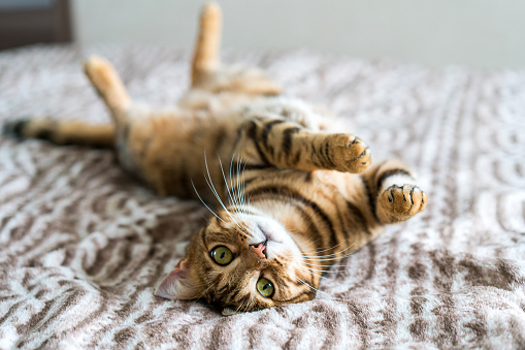Our Services
Cat Behavior
With a method that integrates knowledge from veterinary clinical & behavioural medicine, environmental enrichment, and training, we have expertise diagnosing and treating behavioural issues.

Cat Behavior
𝑊ℎ𝑜 𝑘𝑛𝑜𝑤𝑠 𝑦𝑜𝑢𝑟 𝑐𝑎𝑡 𝑏𝑒𝑡𝑡𝑒𝑟 𝑡ℎ𝑎𝑛 𝑦𝑜𝑢? 𝑁𝑜𝑏𝑜𝑑𝑦!
Every cat is unique, however, cats hide almost everything (especially pain), so you might not realize that they’re hurting. Their cryptic behavior is a hold-over from their past, when they lived in the wild instead of our living rooms.
Establish your cat’s normal, or at least a baseline of their behavior today!
Having a normal behaviors baseline, makes detecting any changes much easier — even small variations in your cat’s “normal” can indicate a potentially big problem.
Behavior issues are one of the most common reasons that adult cats are relinquished to shelters
- Urinating Outside of Litter Box
- Destructive Scratching
- Aggression
The Importance of Vaccinating Your Cat
Ensuring your cat receives vaccinations is a critical part of their overall health and well-being. Not only can vaccinations prevent many life-threatening illnesses, but they can also safeguard against diseases prevalent in wildlife and those transmissible to humans. It’s crucial to begin administering vaccinations when your cat is young, as their developing immune systems require protection to stay healthy. Even cats who live strictly indoors should receive vaccinations, as they can still be exposed to diseases.
To determine which vaccinations are necessary or recommended for your pet based on their age, health, and lifestyle, consult with a veterinarian at Pets I Love.
Is Your Cat Exhibiting Odd Behavior, Peeing Outside of Litter Box, Spraying?
- Medical Problems
If your cat is peeing outside the litter box, the first step is to visit your veterinarian. The veterinarian will do a physical exam of your cat and check a urine sample. Based on the results, your veterinarian will recommend treatment. This could be due to urinary tract infections, urinary blockages, bladder stones, diabetes mellitus, or other similar conditions.
- Stress
Your cat may be trying to tell you they’re stressed out at home. Cats are sensitive to the smallest of changes in their environments (like a new baby in the house or someone moving out). They do this as a way of communicating with others in their environment when they’re feeling overwhelmed by their circumstances.
- Dirty Litter Box
Cats are particular about their toilets. The litter box may simply be too dirty for your cat. Or it may be perfectly clean but otherwise uncomfortable to use. For example, the box may be too small for your cat to use comfortably. Or it may be in a location that your cat doesn’t like. If it’s covered, this may bother your cat.
- Behavioral Reasons
If no medical cause is found for your cat’s inappropriate urination, then it’s important to determine what factors are causing your cat to behave this way. If you’ve ruled out everything else, consult with veterinarian to get to the bottom of the problem.
Understanding Your Cat's Scratching Behavior
Scratching is a completely normal and instinctive behavior for cats. They do it for various reasons such as marking objects with their scent (there are scent glands located in their paws), expressing emotions like excitement or stress, removing the dead part of their nails, and stretching their bodies.
It’s important to keep in mind that cats do not have a concept of right or wrong. They only think in terms of fulfilling their needs. So, when a cat feels the need to scratch, they won’t consider what humans prefer, but rather, where they prefer to scratch.
- Clip your cats’ nails regularly
- Place the scratching post in a location where the cat wants to scratch
- Use catnip and toys to encourage scratching on desirable surfaces
- Reward good behavior with treats
Understanding Your Cats Aggression
There are a number of different types of aggression that cats can display. A medical workup is essential for all aggressive cats. Some cats behave aggressively because of a medical condition or complication.
Acute pain, orthopedic problems, cognitive dysfunction in older cats, neurological disorders of any age and sensory deficits can show increased irritability and aggression in your cat. Senior cats may suffer from confusion and insecurity, which could prompt aggressive behavior. If a medical problem is detected, your Pets I Love veterinarian will work closely with to give your cat the best chance at improving.
- Early intervention is best
- Physical punishment can increase a cat’s fear or anxiety and worsen aggression
- Aggressive behaviors in cats can be managed to an acceptable level with proper tools and by working consistently with your veterinarian
When cats are in unfamiliar places (like a veterinarian’s exam room), it’s not often that they will show signs of pain or discomfort. That’s why your veterinarian relies on you to report changes in your cat’s behavior for more accurate diagnoses.
If you have any questions or wish to schedule a behavior consultation for your cat, please call us at 845-395-9200. Dr. Szpicek, Dr. Smatt, and the team at The Pets I Love are available to assist you, and we’re always ready to provide the care and support your dogs’ needs!
